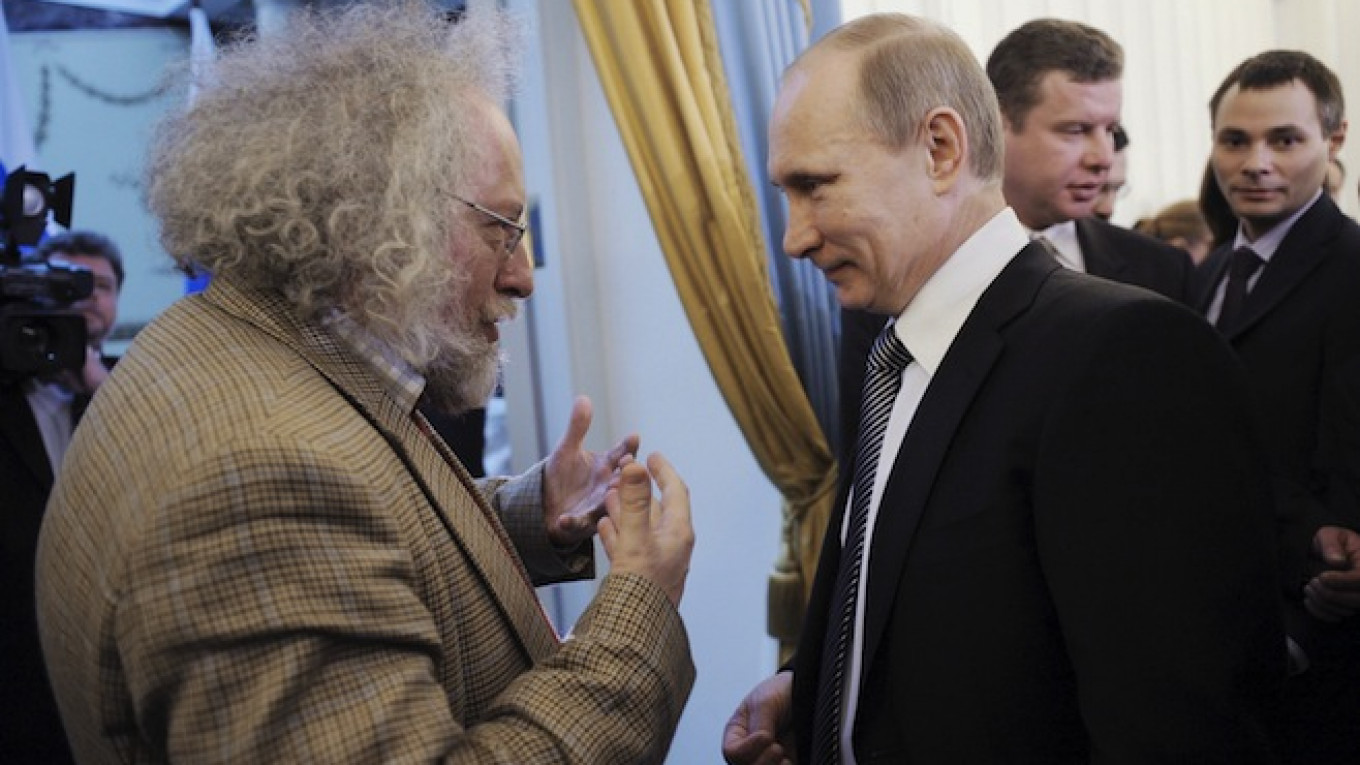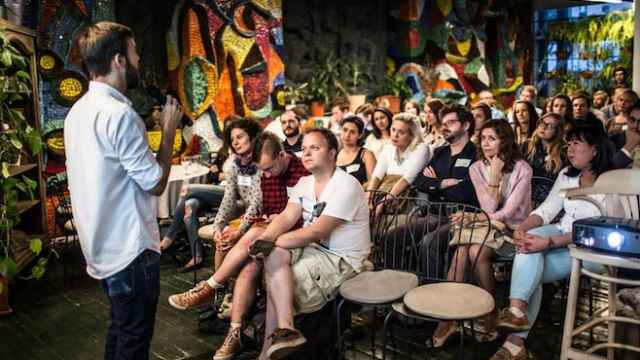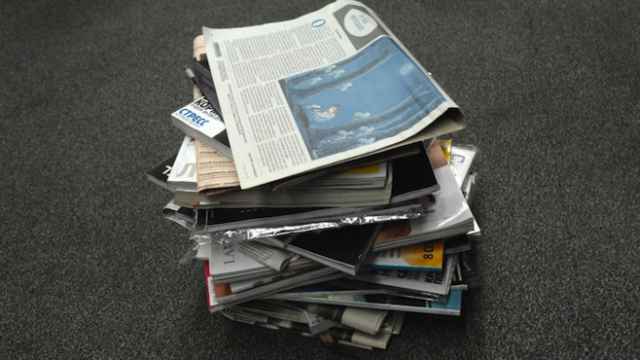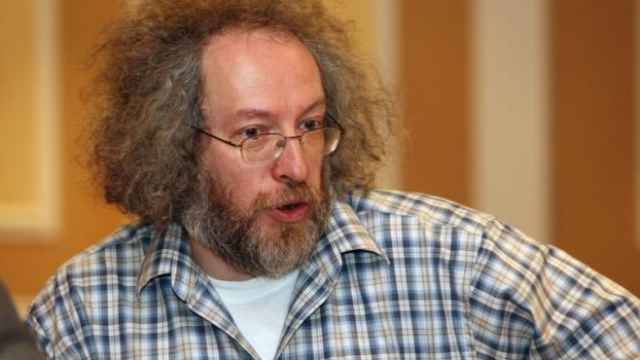Alexei Venediktov, one of Russia's most prominent journalists, does not go out without a bodyguard and does not answer mobile phone calls for fear of being tracked.
He has worried about security since someone left a chopping block with an axe in it outside his apartment in 2009 and he fled Russia for a week this year, fearing he was on a hit list.
Such precautions do not seem out of place in a country where at least 17 journalists have been killed in the past 14 years, or for an editor whose radio station has been accused by President Vladimir Putin of "pouring diarrhea over me day and night."
With state media waging a full-scale information war over the crisis in Ukraine, independent media such as Ekho Moskvy, where Venediktov is the veteran editor-in-chief, are battling to survive — and fear the noose around them is tightening.
In a series of interviews, editors of such outlets said they rarely feel direct pressure to toe the line but the Kremlin has financial, legislative and judicial levers at its disposal, and speak of intimidation and bullying of advertisers.
"You have to work as though each day at work could be your last … That's what my journalists think and that's how they work," Venediktov said in an interview at the station's busy headquarters in a high-rise Moscow office bloc.
Suggesting Ekho Moskvy could survive only as long as Putin allowed it, he said: "We know that the future of Ekho Moskvy depends on one person, one person in one office."
Kremlin critics accuse Putin of intensifying a campaign to stifle dissent, clamping down on civil society and using the media as a political weapon to maintain his grip on power and influence public opinion — charges the Kremlin denies.
The existence of a few media organizations which criticize the authorities helps Putin deflect criticism at home and abroad that Russia does not allow media freedoms, and gives the opposition a way to let off steam.
Coverage even by independent media is restrained by Western standards, with direct criticism of Putin rare, though Prime Minister Dmitry Medvedev's government is considered fair game.
Taking on Putin directly over his wealth or personal life is widely seen as out of bounds. One newspaper, Moskovsky Korrespondent, made a splash by publishing allegations about his love life in 2008. It closed mysteriously soon afterwards.
Indirect Pressure
One of Putin's initial acts after rising to power in 2000 was to restore Kremlin control over the media, which was much more outspoken under President Boris Yeltsin in the free-wheeling decade after the Soviet Union's collapse in 1991.
Most Russian media are now owned by the state or by private individuals or companies loyal to Putin.
Such media have been on little less than a war footing since Ukraine's pro-Moscow president, Viktor Yanukovych, was ousted in February 2014 and Russia responded by annexing the Crimea Peninsula and giving political support — and Kiev and the West say military backing — to a separatist uprising in east Ukraine.
Despite such tight control, Venediktov, his unruly hair and beard now grey at 59, says he only occasionally has criticism of his coverage conveyed to him by the authorities, "sometimes over tea, sometimes over vodka, sometimes over cognac."
Indirect pressure is much more common.
Ekho Moskvy has felt the heat from Russia's media regulator, which warned it last year over a program about Ukraine which the body said contained information "justifying practices of war and other crimes." A second warning would mean closure.
Venediktov says the company that controls the station and is loyal to Putin — Gazprom-Media Holding — has been unable to oust him as editor because this would require the support of his journalists. But he feels economic pressure from a drop in advertising and a downsizing of his advertising department.
The fact that Venediktov is able to cling to his job and continues to criticize the authorities is held up by Gazprom-Media Holding as evidence that it respects media freedoms.
Kremlin spokesman Dmitry Peskov underlines this by saying that the station's editorial line has "never been an obstacle for normal business-like communication" between Putin and Ekho Moskvy, including with Venediktov.
Yevgenia Albats, editor-in-chief of the New Times magazine, says she is surprised when asked why she thinks Putin allows some independent media to exist.
"Russia is not a totalitarian state," she says, even though the Kremlin has many ways to squeeze outlets that criticize it.
"If you are loyal [to the Kremlin] you get ads. If you are not loyal, you don't get ads," Albats said.
She said New Times was raided by police three years ago, she once found a listening device in her home and added in an interview in her office that she had no doubt "we have a couple of other people in on this conversation."
The magazine's recent stories include an investigation into how Russia reached the decision to annex Crimea from Ukraine last year and concluded the plan was drawn up by four people. It also wrote about problems suffered by gays at a time when this was widely seen as taboo for Russian media.
The New Times gets by — just — on sponsorship, sales and subscriptions.
"It [the situation for independent media] is getting worse, much worse, I guess since the beginning of the Ukraine conflict," she said.
"It's harder to get information, it's harder to get to decision makers, it's harder because people are afraid to give you interviews, afraid to be mentioned in the magazine."
Broadcasting From an Apartment
Dozhd, which made its name as an independent cable and Internet outlet during opposition protests in the winter of 2011-12, suffered a big financial blow when cable operators in one fell swoop canceled their contracts last year.
Dozhd also found it was no longer a desirable tenant for landlords and was forced to move office several times. For a while it resorted to broadcasting from an employee's flat but has now found a studio in a trendy business and shopping center.
After a year of almost constant worry, the channel's general director, Natalya Sindeyeva, embodies its slogan as the "optimistic channel."
"For me it's alright now because we are operating," she said. "If you speak about the wider context, it's difficult, not only politically but economically."
Dozhd hit problems after running a poll last year asking whether Leningrad, now St. Petersburg, should have given up to Nazi German forces during World War II rather than refuse to surrender. Hundreds of thousands of people were killed in the siege and Putin's spokesman said the poll had "crossed a line."
Set up in 2010, the network had been vulnerable after giving a voice to Kremlin critics.
Sindeyeva said the channel has managed to survive by going behind a pay wall and switching to a subscription basis.
Dozhd has about 70,000 subscribers, editor Mikhail Zygar said, paying around 4,800 rubles ($80) a year. It can reach about 12 million people a month on television and the Internet.
Other leading independent media are threatened by a law that will limit foreign ownership of Russian media to 20 percent, introduced to "defend national sovereignty."
Among newspapers under threat is Vedomosti, a business daily with a print run of 75,000 that often criticizes the government.
Finnish company Sanoma sold its one-third stake in Vedomosti — along with ownership of The Moscow Times — in May to a Russian businessman, Demyan Kudryavtsev.
The Financial Times Group and Wall Street Journal owner News Corp own similar stakes in Vedomosti, and say they are reviewing the implications of the legislation on foreign ownership.
Patriot Games
Announcing the seizure of Crimea on March 18 last year, Putin warned against "action by a fifth column, this disparate bunch of 'national traitors'" — a phrase that has widely been seen as including any media speaking out against the annexation.
Putin has little less than a media army at his disposal. As in Soviet days, some news outlets have a direct phone line to the Kremlin, media sources say, and top editors take part in regular meetings with Kremlin officials to discuss content.
Dmitry Muratov, editor of the investigative newspaper Novaya Gazeta, said most Russian media have simply become "instruments of mass propaganda and manipulation."
His newspaper, part-owned by former Soviet leader Mikhail Gorbachev, said in March it may have to stop its print edition because of a lack of funds. For now, though, it is still going.
Across the hall from Muratov's office hang the portraits of six Novaya Gazeta journalists killed since 2001 including Anna Politkovskaya, shot dead on Putin's birthday in 2006.
Another, Yelena Milashina, left the southern, mainly Muslim region of Chechnya in May this year after a border guard warned her that her life was in danger. A local newspaper later published an article widely seen as a death threat.
The New York-based Committee to Protect Journalists says 17 journalists have been killed in Russia because of the work they were doing since 2001. Other groups say the toll may be higher. The International Federation of Journalists said in a 2009 report that 313 Russian journalists had been killed since 1993.
Despite such a hostile environment, Novaya Gazeta's Muratov prefers to look on the bright side, underlining that there is still some room for independent media in Russia.
"If there's a future for this country, there's a future for independent media," Muratov said.
A Message from The Moscow Times:
Dear readers,
We are facing unprecedented challenges. Russia's Prosecutor General's Office has designated The Moscow Times as an "undesirable" organization, criminalizing our work and putting our staff at risk of prosecution. This follows our earlier unjust labeling as a "foreign agent."
These actions are direct attempts to silence independent journalism in Russia. The authorities claim our work "discredits the decisions of the Russian leadership." We see things differently: we strive to provide accurate, unbiased reporting on Russia.
We, the journalists of The Moscow Times, refuse to be silenced. But to continue our work, we need your help.
Your support, no matter how small, makes a world of difference. If you can, please support us monthly starting from just $2. It's quick to set up, and every contribution makes a significant impact.
By supporting The Moscow Times, you're defending open, independent journalism in the face of repression. Thank you for standing with us.
Remind me later.






